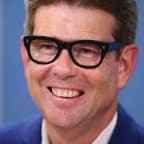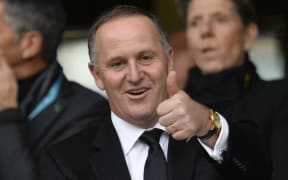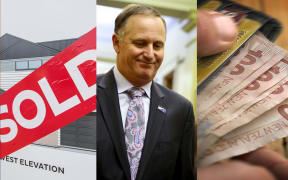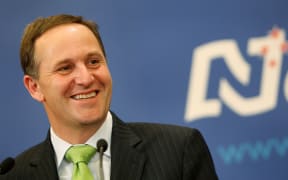First Person - As John Key steps out of the limelight, RNZ's John Campbell looks back on an accidental politician with a magical ability to sell his party to the people.
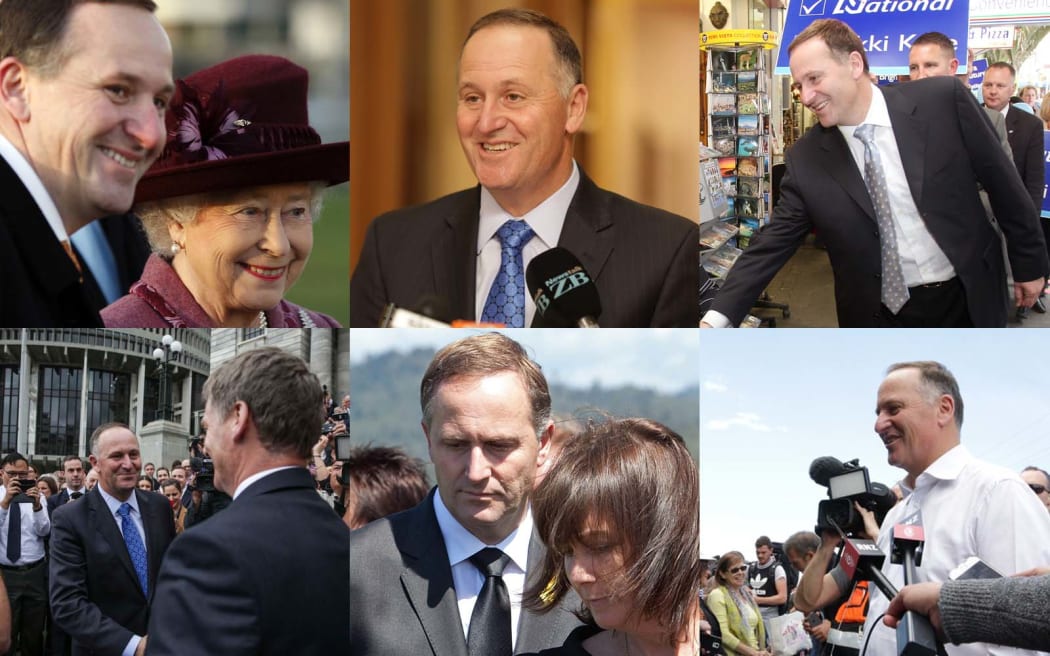
The persona of ideal barbecue guest, everyman was one John Key could produce with remarkable energy on any occasion. Photo: AFP / RNZ
Some years ago, I think it was in the run-up to the 2011 election, I was on the road following John Key.
We were in the West Coast electorate, birthplace of the Labour Party, which had found itself in the unlikely possession of a National Party MP - Chris Auchinvole. The prime minister travelled in a Crown car, and Auchinvole travelled along behind in his own vehicle, a sports car of some description, in which he looked as happy and incongruous as a man who had just won Lotto and was driving home from the car-dealer after his first splurge.
Somewhere, we ended up in a bar where Key played pool with the locals. It was pro-forma stuff. Coasters know bullshit when they see it, but that doesn't mean they can't enjoy the experience. The balls went click, pints were emptied, a warm vanilla nothingness enveloped us all, and time passed without casualty.
After a while, I noticed Auchinvole had essentially given up any pretence of participation. He was standing against the bar, looking on. He was there, yes, this was his electorate and he was their MP, but none of what was happening was actively about him. The prime minister, ostensibly accompanying him, had upstaged him so completely that he had almost been removed from his own guest list.
In a way, that was Key's relationship with the National Party: casually patrician, slightly at odds with the narrative portraying him as the ideal barbecue guest; an everyman. It was a persona he could produce with remarkable energy on any occasion. He was a lighthouse in that respect: turning and shining, turning and shining. But last week, as Bill English, Judith Collins and Jonathan Coleman put their names forward to replace him, I spoke to another Cabinet member. "What was your relationship with him like?" "Professional. Entirely professional. We spoke, when we needed to, but nearly always about work."
Still, and here's the crucial detail, back at that West Coast bar, having found himself a spectator at his own party, Auchinvole was grinning from ear to ear. He did not need to participate. That was not the point. Simply by being there, Key was sprinkling him with a kind of fairy dust.
A friendly guy that likes to interact
Key's ability to connect with people was the centrepiece of his government's identity: its greatest and most visible asset. When, in 2011, Young Nats began taking to the campaign trail in T-shirts proclaiming "I'm a KEY person", beaming with pride at their membership of Team Key, it was the man, not the party, their chests declared they belonged to.
And when, in 2014, the @InternetPartyNZ Twitter account posed the question: "Who are you voting for??", rugby hero Dan Carter, who did not live in the Helensville electorate and therefore couldn't do so, didn't answer "National" but (for the edification of his 500,000 followers) "John Key".
John Key. He was, as he told TVNZ's Q & A programme in April last year, "a friendly guy that likes to interact with the public. I do like to have a bit of a laugh and I'm probably the most casual prime minister New Zealand has had".
Mark Textor, co-founder of Crosby/Textor and a Key adviser, elaborated on this in Australia's Business Insider the day after Key resigned: "Growing up the son of a single mum in the suburbs gave him an everyman's touch. He wasn't cool, but people liked that. If anything, his dorkiness translated into empathy and sincerity."
Labour misjudged its response to this. Its strategy of responding with unconvivial jibes, effectively telling a charmed electorate that they were duped, wrong and essentially foolish for falling for it (that, in short, Labour knew better than them), played into Key's hands so generously that he couldn't reasonably have asked for more. If he had a vulnerability it was with a timidity of policy, not with his sales pitch.
The National Party, for its part, like Chris Auchinvole in that West Coast bar, grinned and stood back.
And why not? If you are led by the most popular politician of a generation, if Dan Carter is endorsing your leader, by name, as a bigger and brighter synonym for your Party, if you're a National prime minister and West Coasters are laughing at your jokes, what party wouldn't want to capitalise on that?
The question, and this is the weight that history will now begin to carry, is how did the party capitalise on that? What did National choose to do in the years in which it was led, beyond gravity and electoral threat, on a sustained honeymoon, by a man who was so very popular? How did National use the fairy dust?
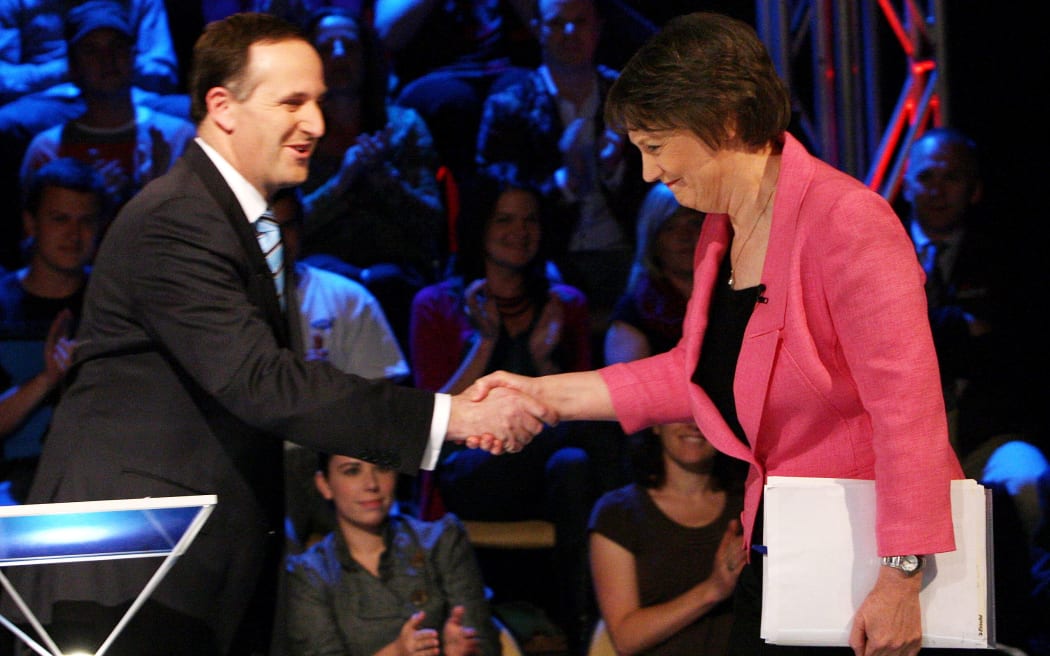
Then Prime Minister Helen Clark shakes hands with then opposition National Party leader John Key during their last televised election debate, in Auckland in 2008, just before Key defeated Clark. Photo: AFP
Good government is more than doing what's popular
Key entered Parliament in 2002. His maiden speech was a pre-Textor, pre-dorky, pre-casual, pre-everyman piece of rhetoric, ripe to the point of jam with admonishments and exhortation. He quoted Peter Fraser ("Too many people expect welfare to provide an armchair ride to prosperity"), declared "There is no substitute for hard work and determination", called for "a society fostering personal responsibility" and a "society based on meritocracy", told us "how privileged we all are", criticised "a new wave of thinking … that oozes political correctness, at the expense of all else", wagged a finger at people "sipping from the half-empty glass, not quenching their thirst from the cup that is half full", and resurrected that famous cut-and-paste line from Tennyson's Ulysses: "To strive, to seek, to find, and not to yield."
It might almost have been satire.
But it also hinted at some larger purpose, a risk-taking, a sense of vision beyond the tepid robotics of calling for harder work.
And the key passage, in this respect, was: "We mustn't be scared to do things because they might offend small groups, or seem unconventional. Good government is more than doing what's popular. Good government is more than blindly following the latest opinion poll."
On election night 12 years later, having just been made prime minister for a third term, Key triumphantly thanked his pollster, David Farrar, by name: the country's "best", he declared, admitting, as the New Zealand Herald reported, that he had rung Farrar "night after night, even though he wasn't supposed to".
The man who'd entered Parliament declaring a belief in something better than poll-driven politics had subverted himself. Gamekeeper turned pollster.
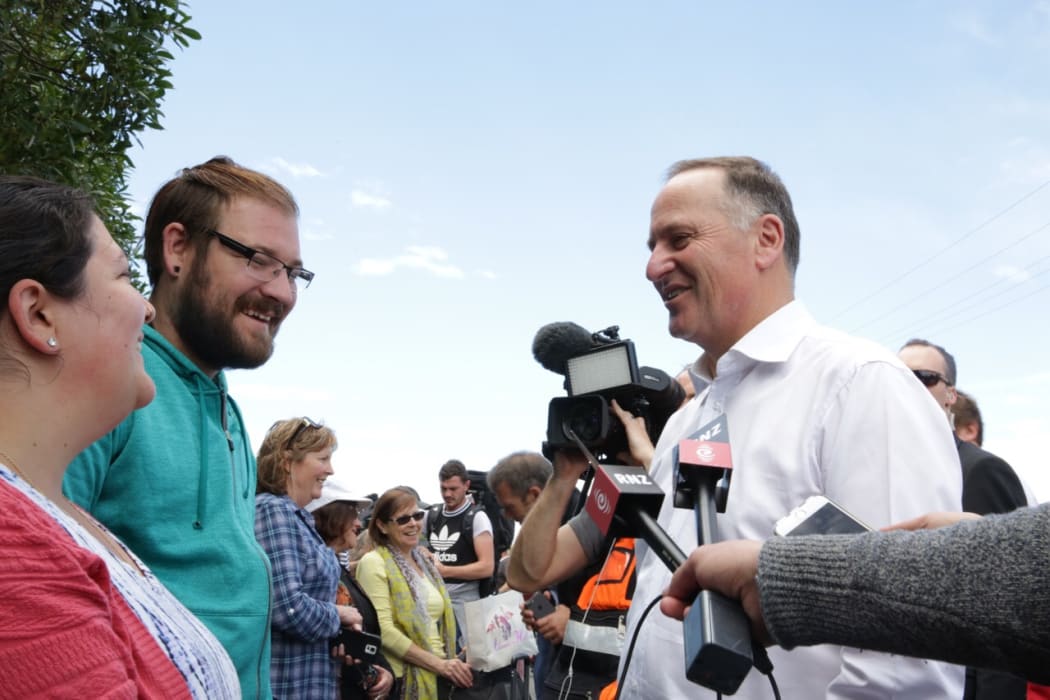
John Key talks to tourists in Kaikōura following the recent earthquake. Photo: RNZ / Rebekah Parsons-King
Aroha Ireland lives in Australia now
So, in the end, how will history judge John Key?
In the age of Trump and Brexit and Manus Island, and having succeeded Don Brash and his divisive Orewa rhetoric, part of what may endure is a sense that, under him, New Zealand did not embrace xenophobia and paranoia and the vilification of Māori, Muslims, Mexicans, blue-collar immigrants and almost anyone who wasn't Tribe White.
To this point, writer and trade unionist, Morgan Godfery, not a natural ally of Key, tweeted on the day the prime minister announced his resignation: "I'll go into bat for Key on this: he rejected the politics of Orewa, avoiding what might have been an ugly decade of tension and conflict."
Had Don Brash become prime minister in 2005, where would New Zealand be now, I can't help asking?
And there was (and still is) the challenge of Christchurch. The country's second largest city and the people who live(d) in it, felled by something too heartbreaking for ordinary politics and too big for the short-term consolation even an instinct for the right words can provide. Christchurch is rising, again, but largely of its own accord.
Sometimes Key did look like a man with a vision that defied tribalism, and one that honoured his early belief in a government that does "more than blindly following the latest opinion poll", and transcended the thudding, compliant orthodoxy of much of the rest of his maiden speech.
In 2007, he collected Aroha Ireland from the "underclass" of Auckland's McGehan Close, and took her with him to Waitangi. She was 12 years old and her eyes sparkled with shy wonder. Key wore a T-shirt with a tiki on it. The country dared to hope it was more than a stunt. Aroha never saw him again. She lives in Australia now.
But in the 2015 Budget, the government increased benefits by $25 a week for families with children. It was the first benefit increase, beyond adjustments for inflation, since 1977. That has weight.
There was a sense of guerrilla raids about these aspects of Key's politics, that they were incursions rather than a beachhead. Even at his most generous, he seemed to have remained persuaded by his mother that "you get out of life what you put into it", and not to have noticed that, inconveniently, upward mobility is not now (if it ever was) simply about determination.
"When I was six", he said in his maiden speech, "my father died; leaving my mother penniless with three children to raise. From a humble start in a state house, she worked as a cleaner and night porter until she earned the deposit for a modest home. She was living testimony that you get out of life what you put into it. There is no substitute for hard work and determination. These are the attitudes she instilled in me."
Key was six in 1967. Among the many things that have changed since then is housing affordability. The IMF's latest Global Housing Watch lists New Zealand's housing market, in relation to household income, as the most expensive in the OECD. Could a penniless solo mother, working as a "cleaner and night porter", paying market rents, now earn the deposit for a modest home?
This is not to belittle the achievement of Key's mother, but to acknowledge that the step up is much higher 50 years on. As the OECD's 2015 Economic Survey of New Zealand states: the "challenge is to lift the economic and social prospects of New Zealanders who have been persistently on low incomes and face material deprivation and multiple barriers to economic and social participation."
Multiple barriers to economic and social participation. The "challenge", to repeat the OECD's word, is to make it as possible in 2016 for people to jump those barriers, as it was when Mrs Key did so almost five decades ago. And that is a challenge that defied incursion politics, the trip north with Aroha Ireland, visits to bars on the West Coast, and the electoral potency of being "a friendly guy that likes to interact with the public".
In the end, in this respect, even the Textor "dorkiness" may not have been enough.
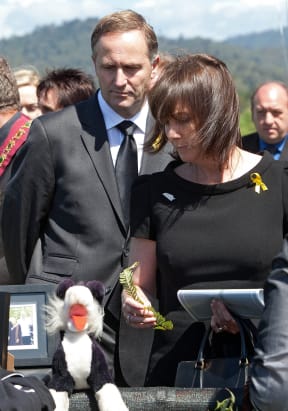
John Key and his wife, Bronagh, at a memorial service for the Pike River miners in 2010. Photo: AFP
This may seem tough. But John Key campaigned, first and foremost, as John Key. And his party embraced that strategy. Why, for example, do many of the Pike families feel let down? Not because of politics, but because of words that seemed beyond politics, because of precisely the kind "empathy and sincerity" Mark Textor praised.
This is what John Key said, behind closed doors, when he met with Pike families on September 22, 2011.
"The first thing is I'm here to give you an absolute reassurance we're committed to get the boys out."
An absolute reassurance. The boys out. When the families heard that, there was spontaneous applause. The human details. The empathy, sincerity and trust. When the clapping stopped, the prime minister continued:
"When people try and tell you we're not, they're playing, I hate to say it, but they're playing with your emotions."
And then John Key made it personal:
"So, you are the number one group that want to get those men out. And, quite frankly, I'm number two. Because I want to get them out."
Five years on, the men are still in. It may be that the risk of getting them out is too great. But, when he was alone with them, Key didn't say that, or qualify his words with that possibility. His was an "absolute reassurance", and the families believed him and have clung to that belief in the years since.
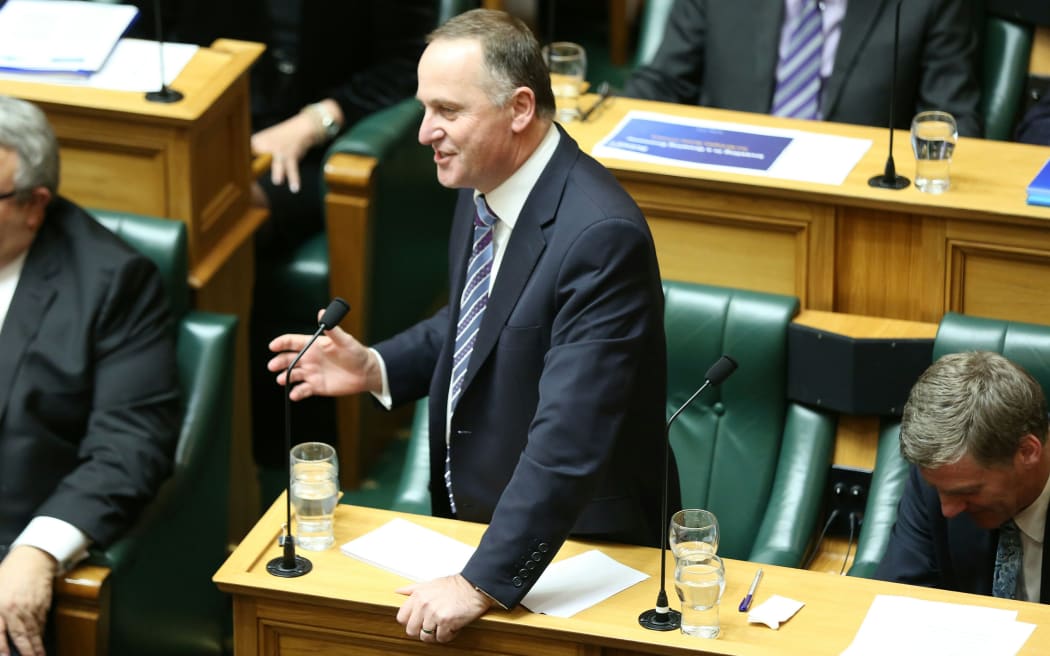
John Key addresses Parliament. Photo: RNZ/Elliott Childs
Now Bill English is prime minister
Mr English will consider the surplus, debt, mixed Treasury projections, an ageing population, low unemployment figures but relatively low wages and high housing costs, and the situation of New Zealanders who "face material deprivation and multiple barriers to economic and social participation", some of whom have jobs and some of whom are children. And then, without Key's extraordinary personal popularity to package his responses in, he will act.
How popular Key was. "I like to be liked", he said, before he left Parliament for the last time as prime minister.
Outside, friends and colleagues waited to farewell him. Their applause was sustained and heartfelt. There have been few scenes like it in the life of that place. He looked overwhelmed: almost, suddenly, shy.
And then New Zealand's 38th prime minister was driven off in the Crown 1 car, to go to Government House and not be prime minister any longer.
What now?
Will National reflect on that sentence in his maiden speech in which Key himself declared: "Good government is more than doing what's popular."
Or was "popular" the triumph?
